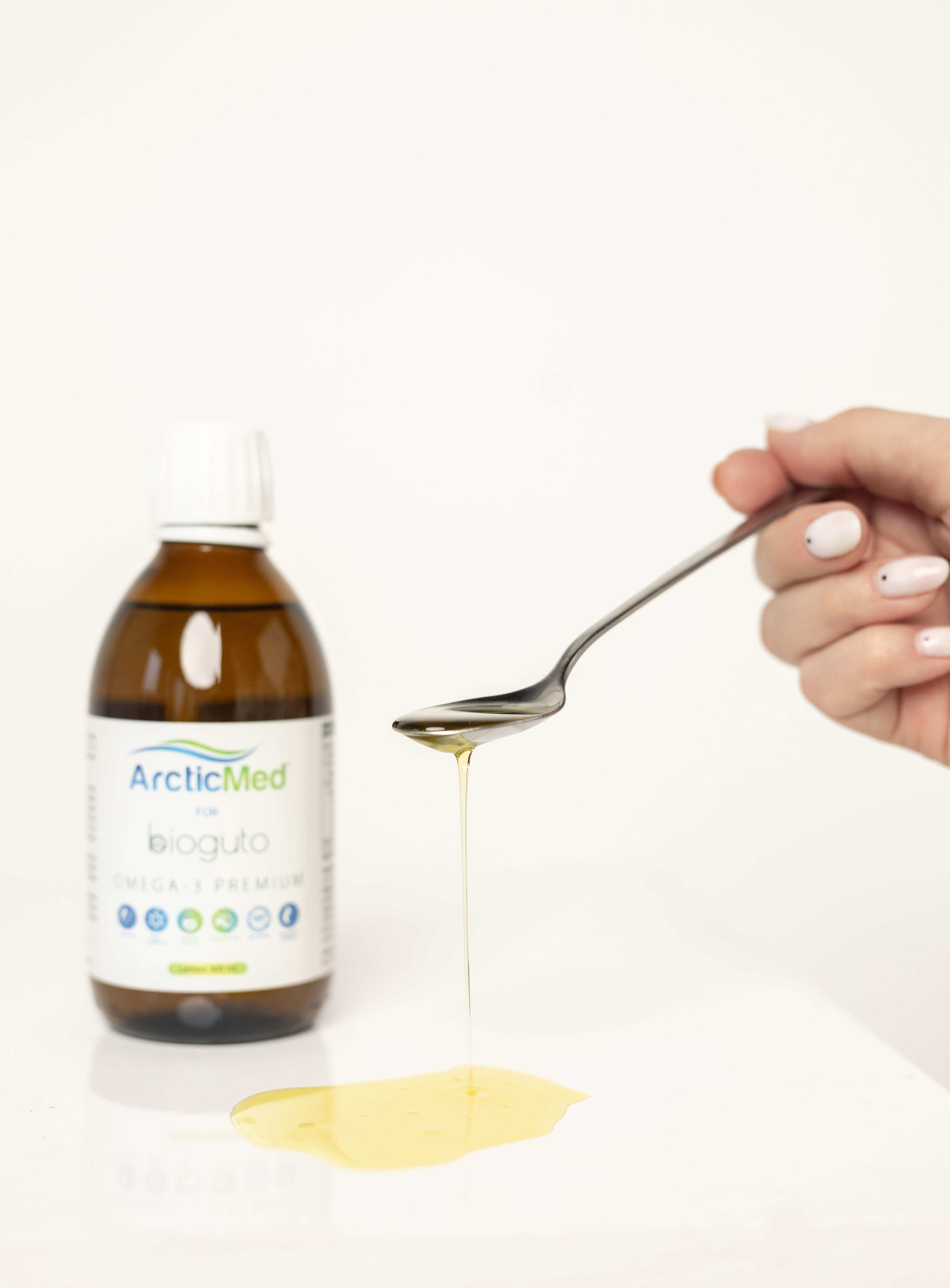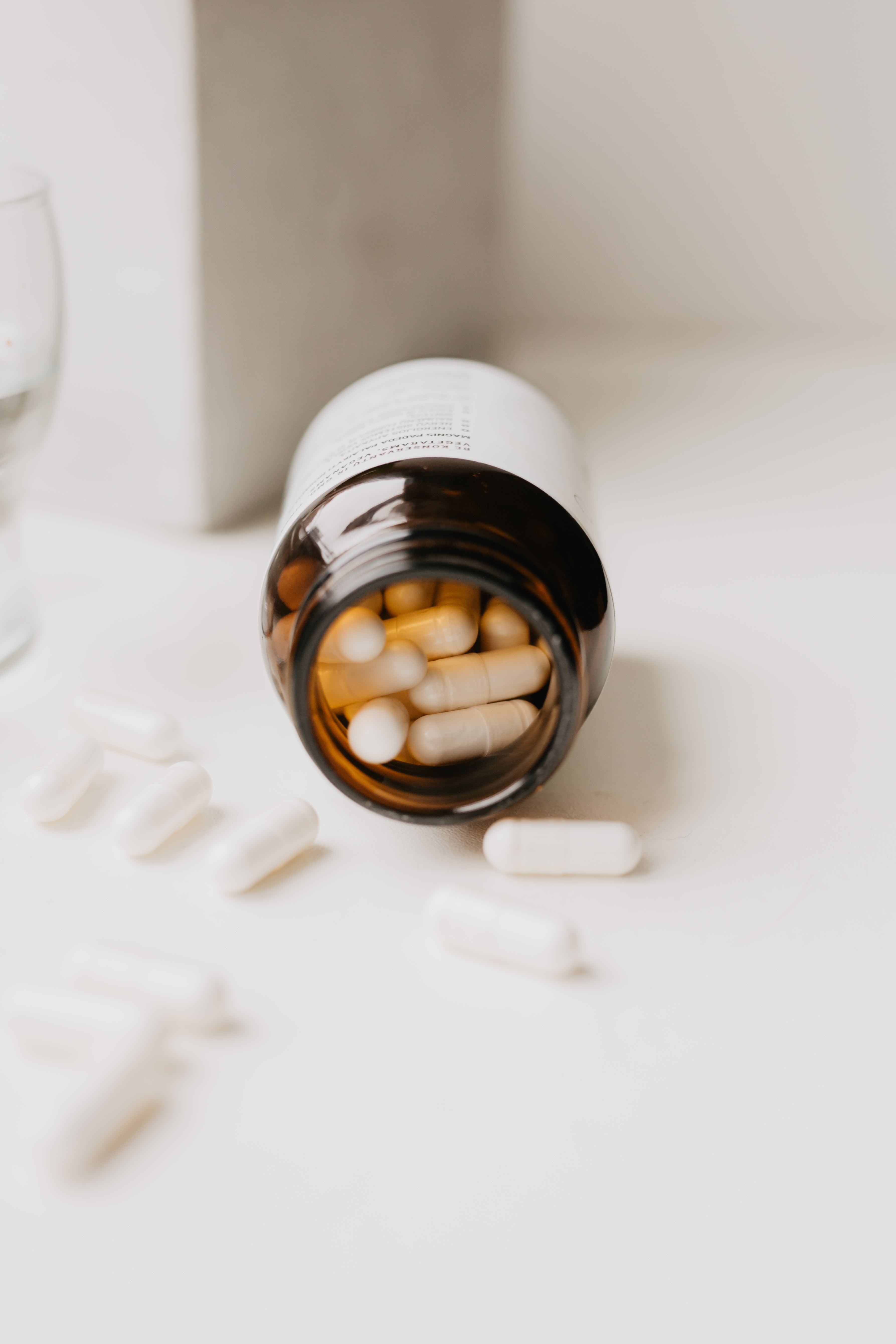Frequently asked questions
Fish contains many natural compounds that protect unsaturated fatty acids (omega-3 among them) from oxidation. These are various water-soluble (eg vitamin C) and fat-soluble (eg tocopherols, carotenoids, ubiquinones) antioxidants and enzymes.
During the refining and purification of fish oil, most of it is lost, and in order to keep the omega-3s intact, antioxidant compounds are added.
These are mostly tocopherols. They keep unsaturated fatty acids stable in the bottle, but in the human body they are far from replacing the complex compounds naturally found in fish. This is one of the reasons why the results of clinical trials in which patients consume fish speak of greater health benefits than the results of studies with fish oil supplements.
Bioguto Omega-3 Premium (ArcticMed) is different from other fish oil products on the market because the olive oil of exceptional quality, rich in polyphenols, protects fragile omega-3 acids by replicating the action of antioxidant compounds naturally found in fish. It protects omega-3s from damage not only in the bottle, but also in the body, and allows them to safely enter human cells and enjoy their benefits.
The liquid is easy and convenient to dose for both adults and children. Bioguto Omega-3 Premium (ArcticMed) is enough for 0.15 ml per kilogram of your body weight. For example, if you weigh 70 kg, you will need to consume 10 ml (tablespoon) per day. If you are giving to an 8 kg baby, you will only need 1.2 ml.
Liquid is easier to swallow. So it is perfect for babies, children, elderly people or seriously ill patients.
A spoon instead of liquid for 10 capsules. The capsule holds about 1 ml of fish oil. If you weigh 70 kg, you should absorb 10 capsules a day, and now one spoonful is enough.
Bioguto Omega-3 Premium (ArcticMed) has a great taste that does not need to be hidden in a capsule.
The liquid can be mixed with food. If you don't like liquid fish oil, try making a sandwich with Bioguto Omega-3 Premium in the morning instead of butter, avocado or olive oil. Just don't forget to first calculate and fill in the amount you personally need.
Bioguto cares about sustainability and environmental protection. Each additional production step, such as encapsulation, requires additional raw material, energy, manpower, and time costs. Leaves a bigger CO2 footprint and more trash.
The recommended average daily dose for children and adults is 0.15 ml/kg. For a person weighing about 70 kg, it is recommended to consume 10 ml per day.
That's enough for a medium tablespoon. If you decide to dose with a spoon, we advise you to measure how many milliliters it holds beforehand.
It is best to take it right before a meal or with a meal at any time of the day. We recommend taking it at the same time every day to form a habit.
The fish oil contained in Bioguto Omega-3 Premium (ArcticMed) is stable, free from heavy metals, phthalates (plastic softeners) and meets all EU requirements for cleanliness and purity of fish oil.
Fish oil comes from sardines, anchovies and mackerel caught in the South Atlantic.
The life cycle of small fish is relatively short. They are more resistant to intensive fishing and therefore have less impact on the environment.
In addition, they are lower on the food chain than, for example, salmon or other large fish, so they accumulate less pollutants such as heavy metals or phthalates.
The fish oil contained in Bioguto Omega-3 Premium (ArcticMed) has the "Friend of the sea (FOS)" certificate, which proves that the product is sustainable and that by consuming it you contribute to the preservation of nature.
Yes. Omega-3 acids work through the same mechanisms as nonsteroidal anti-inflammatory drugs (NSAIDs) such as ibuprofen, diclofenac, naproxen, and others to reduce pain and inflammation. Only affects more ignition circuits than these.
Numerous studies have shown that omega-3 consumption significantly reduces the levels of key pro-inflammatory compounds within the first few weeks. It is important to note that NSAIDs produce a very rapid pain and inflammation-reducing effect, while omega-3s cannot be expected to act so quickly, as they take time to penetrate cell membranes and replace arachidonic acid (the raw material for the production of pro-inflammatory compounds). Depending on the situation, this can take anywhere from a few weeks to a few months. Read more about Omega-3 and inflammation. What and how happens in the body during it?
The effects of omega-3 are very well illustrated by Maroon et al. in 2006 conducted a study to determine how omega-3 affects non-specific neck and back pain. 78 percent subjects used 1200 mg EPR with DHA, and 22 percent - 2400 mg. After 75 days of omega-3 use, 59 percent subjects stopped taking pain and inflammation medications, and 80 percent were satisfied with their improved well-being. No side effects were observed.[1]
[1] Maroon, Joseph Charles, and Jeffrey W. Bost. "ω-3 Fatty acids (fish oil) as an anti-inflammatory: an alternative to nonsteroidal anti-inflammatory drugs for discogenic pain." Surgical neurology 65.4 (2006): 326-331.
Yes. It does not contain fish protein, so this fish oil is also suitable for people allergic to fish (we always recommend trying it on the skin first).
The fish oil comes from sardines, anchovies and mackerel caught in the South Atlantic and has the Friend of the sea (FOS) certificate, which proves that the product is sustainable and that you are contributing to the preservation of nature by consuming it. a certificate proving that the product is sustainable and that you contribute to the preservation of nature by using it.
The palate is tickled by oleocanthal (a powerful antioxidant) contained in the highest quality extra pure cold-pressed olive oil included in the composition. Olive oil experts know that the urge to cough after tasting olive oil is a sign of particularly high quality. We remind you that after taking Bioguto Omega-3 Premium, you can always drink or eat something to make the tickling go away faster.
Yes. Even necessary, especially if you eat little sea fish and other seafood. Omega-3 acids are included in the composition of every cell and are vital for the development of the fetal brain and eye retina.
Studies show that omega-3 used during pregnancy increases the weight of the newborn and improves other anthropometric indicators, promotes language development, improves visual acuity and response to stress, reduces the risk of obesity and improves mental abilities.
Meanwhile, omega-3 protects pregnant women from premature birth, helps fight preeclampsia, perinatal and postpartum depression, and has a positive effect on glycemic control and inflammatory indicators during pregnancy.
Many different studies have been conducted to investigate the effects of omega-3 on the mother and the fetus. But one, in 2003 conducted in Norway by Helland et al. is particularly telling: 4 years after birth, children whose mothers took EPR and DHA during pregnancy scored higher on tests of mental ability than children whose mothers did not take omega-3.
Yes. Omega-3 acids are essential for babies as they grow and develop their nervous system and retina. It is very important that the fetus receives a sufficient amount of omega-3 while still living in the mother's womb, so it is recommended that the mother consume them during pregnancy.
After the baby is born, as long as his main food is breast milk, if the mother is getting enough omega-3 (ie, she eats fatty sea fish several times a week or takes supplements with omega-3), she does not need to be given extra fish oil. But if the formula is fed or the mother does not get enough omega-3 unsaturated acids, then it is necessary to give them to the baby as a food supplement.
When breast milk gives way to another food and it is not rich in omega-3, it is recommended to include omega-3 in the baby's diet as a food supplement.
Research shows that a sufficient level of omega-3 in the body supports the cognitive, social and physical development of babies, as it promotes visual acuity and retinal development, the development of mental and motor skills, a healthy immune response to allergens, language and cognitive development, and concentration.
Triglycerides. In this form, omega-3 fatty acids are naturally found in fish. The human body easily recognizes triglycerides as natural substances and absorbs them very well. In addition, they are more stable.
in 2019 study shows that omega-3 polyunsaturated fatty acids (EFA with DHA) protect against memory impairment caused by chronic sleep deprivation.
The study was conducted with rats. They were deprived of sleep and watched as they performed memory tasks and counted the number of mistakes they made. In terms of memory testing, the number of errors made in both long-term and short-term memory tests was highest in the sleep-deprived group. But what was very interesting was that the rats that were not allowed to sleep but got extra omega-3 made the same number of mistakes as the control group or the group that got extra omega-3 but were able to get a good night's sleep.
Necessary. Omega-3 unsaturated fatty acids are a particularly important component of our body. For this reason, it is necessary that the child receives a sufficient amount of omega-3 while still living in the mother's womb, during breastfeeding, feeding, and throughout the rest of childhood.
Adequate levels of omega-3s in children help them concentrate, learn, improve sleep quality and mood, suppress allergies and inflammation, and have many other benefits.
Yes. Research shows that adequate levels of omega-3 in the blood can improve mood and even prevent depression.
Yes, adequate intake of omega-3 improves sleep quality in both adults and children. Studies show that omega-3 levels are directly correlated with better sleep in children. They wake up less often and sleep longer. Adequate omega-3 intake during pregnancy is also associated with better sleep patterns in the baby.
Yes, it can help you focus better. This is especially important for children with attention deficit hyperactivity disorder (ADHD). Studies show that adequate consumption of omega-3 reduces their impulsivity, increased activity and helps them focus more.
Yes, it can help you learn. Research shows that children who get enough omega-3s have better memory, plan and learn more easily. It has also been observed that children with too low levels of omega-3 in their blood exhibit worse behavior, are more emotionally sensitive, read poorly, and are more prone to dyslexia (boys).



